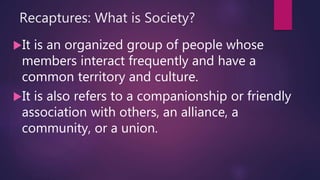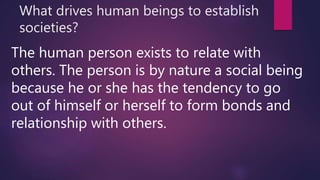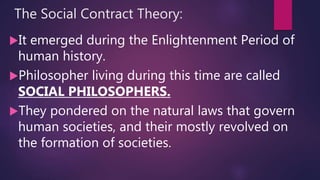The Human Person in the Society II
- 1. THE HUMAN PERSON IN THE SOCIETY LORETO C. JUGO JR. SST-II BUSAO NATIONAL HIGH SCHOOL BUSAO, MARIBOJOC, BOHOL
- 2. Recaptures: What is Society? ’üĄIt is an organized group of people whose members interact frequently and have a common territory and culture. ’üĄIt is also refers to a companionship or friendly association with others, an alliance, a community, or a union.
- 3. What is the Origin of the word SOCIETY? The term "society" came from the Latin word societas, which means comrade, friend or ally. It is used to describe a bond or interaction between parties that are friendly, or at least civil.
- 4. What drives human beings to establish societies? The human person exists to relate with others. The person is by nature a social being because he or she has the tendency to go out of himself or herself to form bonds and relationship with others.
- 5. Our freedom gives us the opportunity to pursue various activities to achieve our goals and attain well-being or happiness. As we live our lives and expand our experiences we also encounter other people who are acting in similar ways which leads to a realization that we donŌĆÖt need to do our activities alone because there are others who are at our side.
- 6. The Social Contract Theory: ’üĄIt emerged during the Enlightenment Period of human history. ’üĄPhilosopher living during this time are called SOCIAL PHILOSOPHERS. ’üĄThey pondered on the natural laws that govern human societies, and their mostly revolved on the formation of societies.
- 7. Who are the Social and Enlightenment Philosophers: ’üĄ THOMAS HOBBES ’üĄ Born on 5 April 1588 Westport, Wiltshire, England ’üĄ Hobbes is best known for his 1651 book Leviathan, which expounded an influential formulation of social contract theory. ’üĄ Founder of the social contracttradition; life in the state of natureis "solitary, poor, nasty, brutish and short"
- 8. Who are the Social and Enlightenment Philosophers: ’üĄ John Locke ’üĄ Born on 29 August 1632 Wrington, Somerset, England ’üĄ was an English philosopher and physician, widely regarded as one of the most influential of Enlightenment thinkers and commonly known as the "Father of LiberalismŌĆ£ ’üĄ Best known that human at birth, the mind was a blank slate or tabula rasa
- 9. Who are the Social and Enlightenment Philosophers: ’üĄ Jean-Jacques Rousseau ’üĄ Born on 28 June 1712 Geneva, Republic of Geneva ’üĄ Best known for his books the Discourse on Inequality and The Social Contract are cornerstones in modern political and social thought. ’üĄ He exemplified the late-18th-century "Age of Sensibility.
- 10. How can we fully understand the character of society? To fully understand the true character of society, they imagined humans as living in a so-called ŌĆ£natural stateŌĆØ removed from modernity and civilization.
- 11. For Thomas Hobbes? What is a ŌĆ£natural stateŌĆØ? How does Thomas Hobbes define ŌĆ£social contractŌĆØ?
- 12. For John Locke? What is a ŌĆ£natural stateŌĆØ? What is the meaning of the concept ŌĆ£consent of the governedŌĆØ?
- 13. For Jean-Jacques Rousseau? What is a ŌĆ£natural stateŌĆØ? What is the meaning of the concept ŌĆ£general willŌĆØ?
- 14. Wait IŌĆÖm still here: ’üĄJohn RawlsŌĆÖ ŌĆ£Theory on Original PositionŌĆØ
- 15. Wait IŌĆÖm still here: ’üĄDavid GauthierŌĆÖs idea on ŌĆ£self-interestŌĆØ
- 16. ’üĄ It is important to note that society is founded on the concept of the COMMON GOOD. ’üĄ The COMMON GOOD refers to the social conditions which enable persons and groups to fulfill their goals and achieve well-being.


















